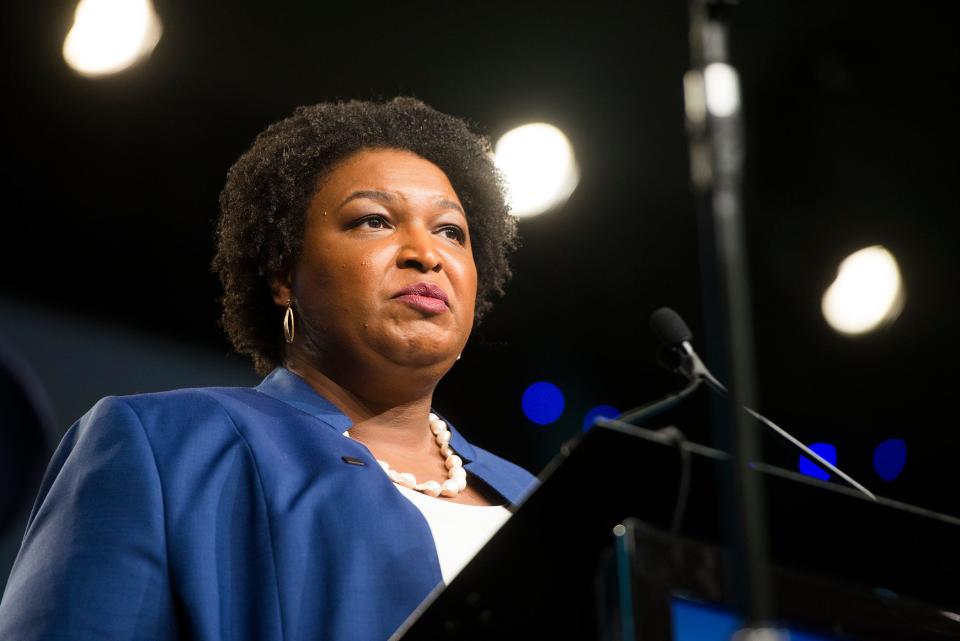Brian Kemp, Stacey Abrams take the stage for debate Monday in Georgia governor's race
- Oops!Something went wrong.Please try again later.
- Oops!Something went wrong.Please try again later.
On Monday, Gov. Brian Kemp and Democratic challenger Stacey Abrams, along with Libertarian Shane Hazel, will appear for their first televised debate of the election at the Atlanta Press Club.
The debate will air live at 7 p.m., and all debates hosted by the Press Club will be available for viewers to watch on GPB.org and The Atlanta Press Club Facebook page.
The race is a rematch of 2018, when Kemp and Abrams faced off for the first time. But Kemp has been in Atlanta for the past four years with a chance to follow through on his promises, while Abrams has raised her national profile as a voting rights advocate. With the cost of living top of mind for many Georgians, both candidates are focusing on pocketbook issues — but voting rights, abortion and guns are also likely to be brought up.

2022 Georgia midterm election: Everything you need to know
Promises, promises? What Georgia governor's candidates said in 2018, have done since
Here is a sampling of the topics the candidates are likely to address in the debate:
Cost of living a key issue

In a September poll conducted by the University of Georgia School of Public and International Affairs for the Atlanta Journal Constitution, 19.6% of respondents listed the cost of living as the top issue facing the country, and 15% listed it as the second most important issue.
Both Kemp and Abrams are focusing on these issues, but with different strategies.
Over the summer, for example, Abrams released an extensive list of policies to tackle housing costs across the state, including allowing local governments more flexibility in zoning and inspection, tax incentives for affordable housing, and increased funding to the Affordable Housing Trust Fund.
"Georgians deserve stable, safe and affordable housing and I'm the only candidate who recognizes this fact and has a comprehensive plan to address Georgia's housing crisis," Abrams said during a news conference on the proposal.
When Kemp's campaign was asked about the policy proposal, they highlighted the state spending $100 million on nonprofits that work on affordable housing and homelessness, but then pivoted to tax relief as a victory to reduce overall cost of living for Georgians.
"Gov. Kemp has refunded over $1 billion to Georgia taxpayers, signed the largest state income tax cut in Georgia history, and suspended the state's gas tax to provide economic relief to Georgians facing 40-year-high inflation and skyrocketing gas prices under the Biden Administration," campaign spokesperson Tate Mitchell wrote in an email at the time.
Another area of disagreement has been health insurance.
Kemp proposed a limited Medicaid expansion that included a work requirement and would have covered 50,000 Georgians who are without health care, a plan that was rejected by the Biden Administration. He's currently working to expand Medicaid for new mothers for a full year after the birth of a child.
Abrams, meanwhile, has been running on full Medicaid expansion for all Georgians making up to 138% of the federal poverty level, arguing that it is especially important when wages have stagnated.
These different approaches to the issue of inflation and cost of living is likely to be a major issue for both candidates during the debate.
Abortion, voting rights and guns
On some key issues facing the state, Abrams and Kemp have set themselves in opposition.
A year after taking office, Kemp signed a new abortion law that prevented abortion after about 6 weeks, a so-called fetal heartbeat bill. The bill passed with one vote, and was stayed by federal courts before it could go into effect.
Earlier this year, the Supreme Court overturned Roe v. Wade and other legal precedent blocking the law, and shortly thereafter Georgia's abortion law took effect. Kemp applauded the ruling, while Abrams used the ruling to take aim at her opponent, saying he achieved his goal "to endanger women, strip away our right to choose, and deny our ability to make medical decisions." If elected, she promises to work on repealing the law.
Voting became a major issue in Georgia in 2020, as COVID-19 and then-President Donald Trump's claims about voter fraud brought election administration front and center. Following that election, Kemp signed SB 202, a controversial law on voting procedures and access following the 2020 election. After losing the 2018 election, Abrams founded Fair Fight and Fair Fight Action, both organizations focused on voter registration and turnout, when SB 202 was signed she called it an attempt to "suppress the vote and seize electoral power."
Kemp also signed a law allowing Georgians to carry concealed firearms without a permit, also called "constitutional carry." Abrams wants to repeal the law if elected.
Some of Kemp's laws on these issues have been more popular with Georgians than others. in a October poll from UGA, a majority of Georgia respondents opposed his laws abortion and allowing Georgians to carry concealed firearms without a permit. The voting law had more mixed results, with a small majority opposing limits on the number of ballot drop boxes but a clear majority supporting absentee voters including a copy of a photo ID.
An expensive contest
Abrams has seen significant fundraising, raising $36 million between the start of July and the end of September, out of $85 million, but she has also been spending heavily — $44 million in the third quarter.
Kemp has raised a total of $60 million, with $28.7 of that raised in the third quarter. He had $15.4 million on hand heading into October, while Abrams had over $11 million.
Millions of dollars have poured into Georgia from across the country to the Senate race and the gubernatorial race as Georgia became a battleground state.
This article originally appeared on Savannah Morning News: Brian Kemp, Stacey Abrams will face off in debate: What to know

